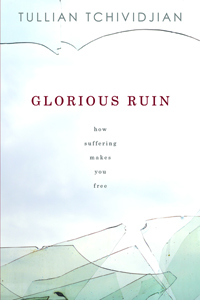Glorious Ruin: How Suffering Sets You Free. By Tullian Tchividjian. Colorado Springs, CO: David C. Cook. 2012. 206 pp. $17.99.
The title of Glorious Ruin caught my attention because of its seemingly inharmonious and unmelodious phrase about dealing with the reality of suffering in our daily living. The title carries the positive word glorious, and connects it to a negative one, ruin! It was good that the author, Tchividjian, has subtitled his book with how suffering sets you free. This very captivating word, suffering, also settles the split-second reaction of its incongruent title, Glorious Ruin, in my mind. The book is easy to read. The contents, though, are difficult to digest.
The book follows a clear outline of thoughts and arguments about suffering. The author begins with a personal introduction that opens with his own share of life’s struggles and suffering. Next, he expounds his main content into three sections. First, he spells out the reality of suffering which demands a sufficient answer from many broken-hearted people. He then sets out to steer the readers from two responses that sound reasonable that are given some by well-intended believers. Some try hard to confront suffering by taking the moralizing path of “if-then” statements. Others turn to the cruel course of minimizing suffering with its beneficial end-results. Finally, the author sounds out his strong thesis on suffering with examples both from the book of Job and from present day people who are set free through suffering. His conclusion brings the readers back to where they should begin when faced with any kind of suffering on earth, that is, to come beneath the cross, where Jesus himself suffered and died to make mankind free.
Written after the very tragic and traumatic experience of shattered dreams when his own very high profile parents (his mother is none other than the daughter of Rev. Billy and the late Mrs. Ruth Graham) announced their divorce after over forty-one years of marriage, the book is deeply relevant to its author. His credential for addressing the heavy-laden topic on suffering is beyond debatable with the painful episode in the church he now serves as a preaching pastor, the Coral Ridge Presbyterian Church. His book is written for such a time like this, when even his readers would also be experiencing some kind of suffering, in different settings and with varied intensities. This reviewer, for one, since receiving a copy of this book, has had to grapple with close friends and relatives being diagnosed with physical illnesses, as they call with their woes and whys. The struggle would also include the unceasing interpersonal disputes and distresses that we suffer for ourselves, for our loved ones and even for the sake of others. As the author starts with the idea that suffering is inevitable, no reader would be able to let go of this book without quenching his/her questioning heart on this pertinent and personal note on suffering.
Nonetheless, the readers soon realize that the author is not focusing on the why God allows suffering, and not even the how we can deal with suffering, but instead, on enlightening his readers about the Who is amid our suffering (p. 25). The Who, the author points out to those undergoing suffering, is God himself, the very God of mercy. This element is hard to grasp in all human suffering because we usually focus on running away from pain. God is somehow hidden in all the wreckage of our human lives. The author uses a lot of biblical passages and biblical words, such as the term glory. What is interesting is that the author cautions against our usage of these biblical jargons and against our thinking that only serves to earn God’s favor or exalt human achievement. For instance, he delineates a theology of glory versus a theology of the cross—the former would view suffering as a means toward personal transformation; the latter sees God’s involvement in self-sacrifice. The author does not sweep away the cries for answers and the pain of suffering process under the rug with biblical passages. He argues for the theology of the cross, helping the readers to look directly into our pain with God’s very present amid our doubts and anxiety. He draws the readers to the range of how others deal with suffering, both in defiance and in compliance. He further calls us to shun two apparently opposite perspectives on dealing with suffering: taking the moralizing tone and or minimizing it religiously. The first approach leads to a prosperity anti-gospel; the other approach leaves the sufferers in despair. Both perspectives actually become a meaningless and godless view on suffering. In different sections the author examines the vivid experiences of Job, whose suffering under the devil’s insinuation is beyond any human comparison. I especially like the part when he mentions, “Job never questions whether or not God is in control… he acutely felt God’s absence” (pp. 178-179).
Moreover, the author overwhelming lays down the Gospel truth of God’s sovereignty, even when suffering tends to shake the very foundation of our Christian faith. Suffering should indeed shake our faith up to a sturdier and stronger grip upon God, who remains very much present with his abiding love. The author gives the readers a serious look at the Gospel message. In its very core, true Christianity demands that the every believer carries own cross in following our Savior and Lord Jesus. Following Jesus is not about going through the broad, wide road; in fact, it is passing this life with him through the narrow gate. The theology of the cross must be seen as God revealed himself through Jesus, who has died to set mankind free. Each kind of suffering that comes our way serves to tear down our security in our ability, to unveil the idolatry of our hearts, and to disband our entitlement to a life of bliss and ease on earth. True enough, though difficult to understand, it is in dying that we can live for Jesus, as the song by Saint Francis echoes down the centuries. Tchividjian has made this claim truthfully: This gospel of suffering makes us cry uncle so that we might cry ‘Abba’ (p. 158). With all these ruminations still fresh in my mind, my initial ‘cognitive dissonance’ from the words Glorious Ruin has been resolved. In all our troubled ruins, God is with us, for us, and alongside us, causing our experiences to be taken in glorious ways. This is a book for everyone who comes and follows Jesus.
Review by Dr. Rosa C. Shao
BSOP, Karuhatan, Valenzuela City, Metro-Manila
